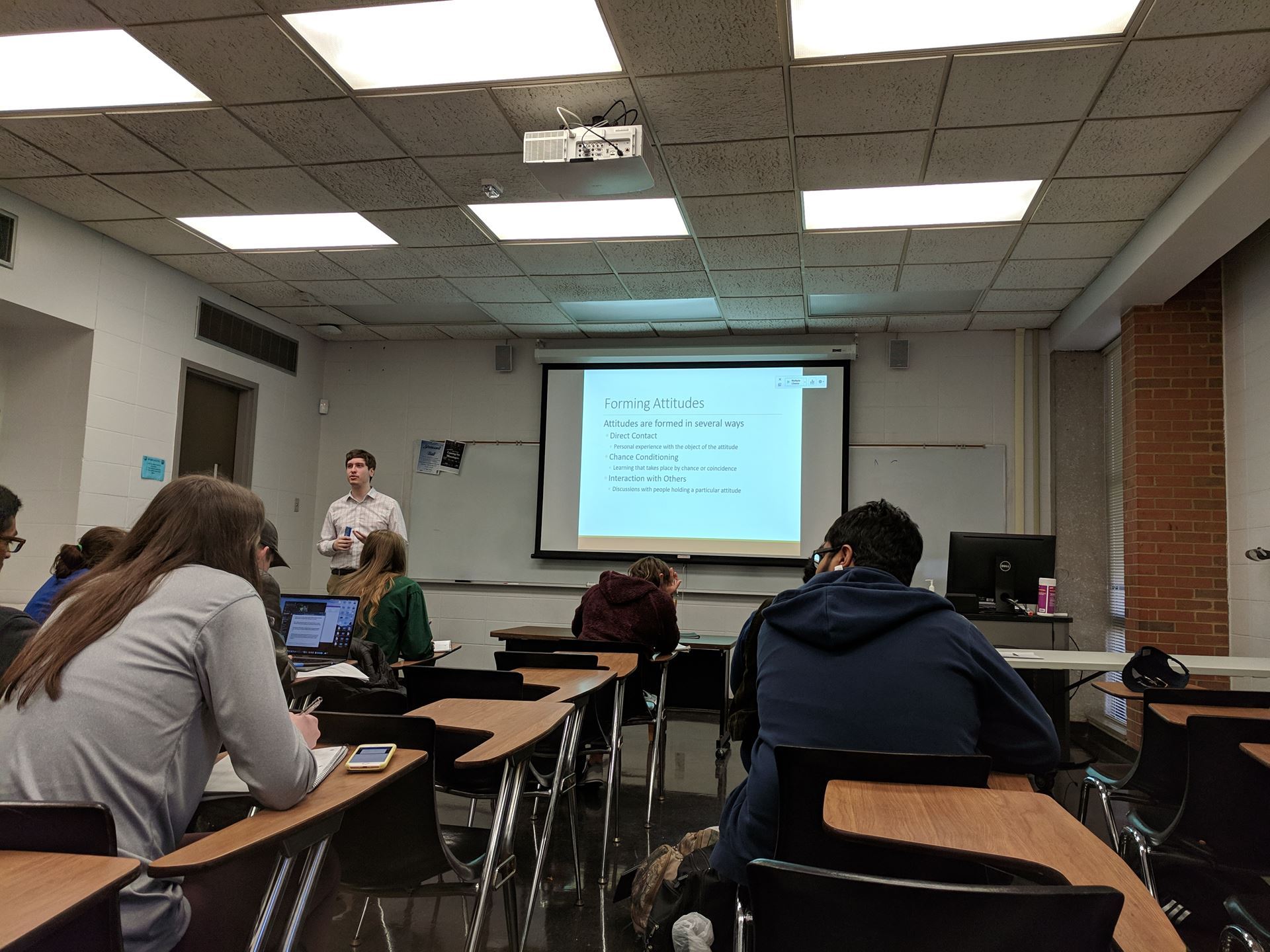 School name: The University of Memphis
School name: The University of Memphis
Type of college/university (e.g., R1, community college, small liberal arts school, high school): Public research university offering bachelor’s degrees, master’s degrees, and doctoral degrees
School locale (e.g., small town, rural area, city, country/region): Urban community of Memphis, TN
Classes you teach: Introductory psychology, abnormal psychology, and introduction to clinical psychology (co-taught with my graduate mentor) all at the undergraduate level
Average class size: 35
What’s the best advice about teaching you’ve ever received?
The best advice about teaching I have ever received was that “research is teaching and teaching is research.” I received that advice from a great teacher I had as an undergraduate student, John Norcross. He taught me a lot about how teaching and research are two professional activities that can (and should!) coexist in productive harmony.
What book or article has shaped your work as a psychology teacher?
Several articles and books have shaped my work as a psychology teacher. I regularly read articles from journals like Teaching of Psychology, Scholarship of Teaching and Learning, and Psychology of Learning & Teaching. A few books that I incorporate are entitled What the Best College Teachers Do (Bain), McKeachie’s Teaching Tips, and An Evidence-Based Guide to College and University Teaching (Richmond, Boysen, & Gurung).
Briefly tell us about your favorite lecture topic or course to teach.
My favorite course to teach is abnormal psychology. It’s a course with a lot of inherently interesting material. I feel lucky to teach that course because students are curious and interested in the material from day one. Their curiosity raises a lot of questions and leads to interesting discussions about human behavior. I do not need to exert any extra effort as a professor to enhance students' interest.
Briefly describe a favorite assignment or in-class activity.
In introduction to clinical psychology, I teach students fundamental clinical interviewing skills – open-ended questions, closed-ended questions, reflective listening, etc. Students pair up and role play interviewer and interviewee for increasingly longer periods of time during the semester. While the students are role playing, I walk around the classroom, listen to interviews, and offer tips to guide their interviews. Students typically feel anxious to conduct interviews at the beginning of the semester, but many of them say how much they learned after we continue to practice.
What teaching or learning techniques work best for you?
I find that using a variety of teaching/learning techniques works best for me. My number one rule is not to lecture for great lengths of time because students become bored or distracted. In class, I use several semi-flipped classroom approaches, discussions, some video clips, and iClickers (they are a great tool for showing me when I was not effective in explaining a topic!). I also use a mix of weekly quizzes and writing assignments in my courses.
What’s your workspace like?
My current workspace is shared with three other graduate students. Usually there is less clutter on my desk (mine has the photo of the dog) but I am in the process of wrapping up my dissertation before heading off to internship. And yes, there is a large tin of cookies as well as two lint rollers in my workspace.
Three words that best describe your teaching style.
Active, organized, enthusiastic
What is your teaching philosophy in 8 words or fewer?
Meet students where they are and facilitate learning
Tell us about a teaching disaster (or embarrassment) you’ve had and how you dealt with the situation.
One embarrassment (that I’m willing to share!) readily comes to mind. In an introductory psychology class, I tripped over a small garbage can and fell to the floor while I was teaching. My students and I all laughed hysterically when they saw I was not hurt.
What is something your students would be surprised to learn about you?
They might be surprised to learn that I initially did not intend to pursue psychology as a major when I was an undergraduate student. I started as a computer science major but quickly learned it was not for me. Then, I spent some time as a philosophy major while enrolled in some psychology classes. I did not think I would pursue psychology until I took a careers in psychology class during my junior year. That’s when I “caught the fever!”
What are you currently reading for pleasure?
I am embarrassed to write that I am not currently reading anything for pleasure. There has not been much time for extra curricular reading as a graduate student… Typically I enjoy reading books about science that are from academic disciplines outside of psychology.
What tech tool could you not live without?
My personal computer. I own a small netbook that is easy to carry with me.
What’s your hallway chatter like? What do you talk to colleagues about most (whether or not it is related to teaching/school)?
I primarily talk to other students (graduate and undergraduate) about our ongoing research projects. We also talk a lot about music, sports, and our pets.
